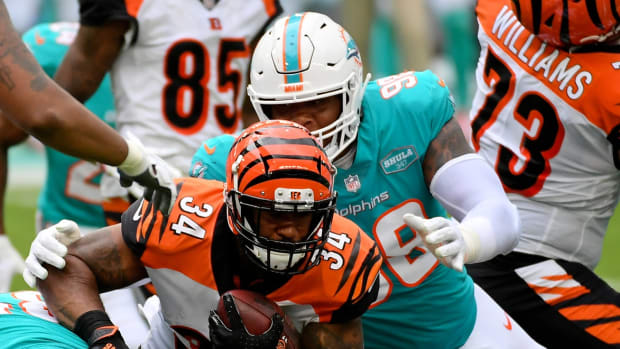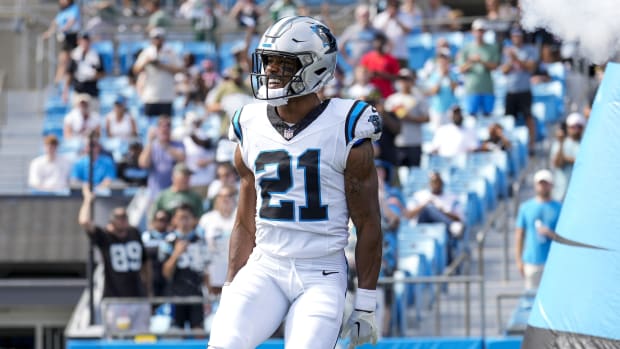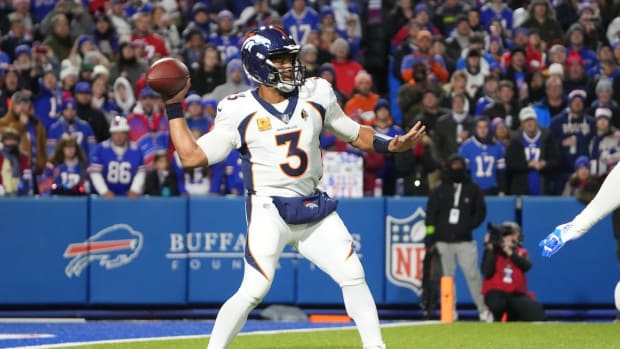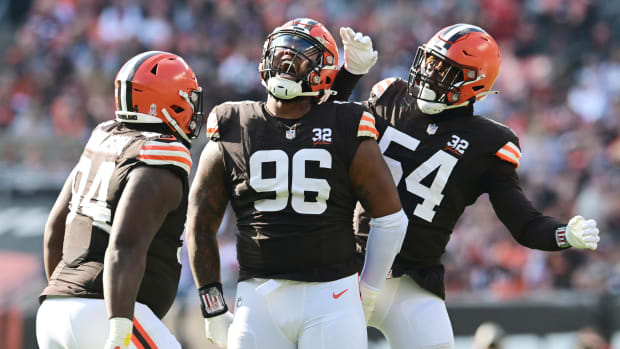Kirk Cousins Is as Nerdy as He Seems, Which Makes Him an Ideal Franchise Quarterback
This story appears in the December 4, 2017, issue of SPORTS ILLUSTRATED. To subscribe, click here.
Because Kirk Cousins is Kirk Cousins, he desperately wanted an office. That is what he asked of the Redskins, and that is what they gave him: a windowless nook with gray filing cabinets and ample storage space, tucked off the lobby at 21300 Redskins Park Drive. Desk jockeys around D.C. relive Cousins’s TD passes at their cubicles every Monday, but the QB imagined that scene in reverse, and over the summer his wish was granted. He even nailed the decor, from the You Might Be a Redneck If ... calendar to the clacking Newton’s cradle to the beach photo taped on a wall.
Months later, Cousins is reveling in excitement over an office gift from one of the facility’s custodians. “Whiteboard cleaner!” he says, displaying the bottle à la Vanna White. He reclines in his swivel chair as he says this, sounding less like Montana and more like Milton from Office Space. But whereas Milton was forever searching for a vanishing stapler, Cousins is looking for something even more elusive: contentment, over his contract status (to be determined, again, this offseason), his growing family (son Cooper was born on Sept. 29) and his better-than-expected NFL career.
It’s tempting to frame the new workstation as just more evidence in the ongoing case of Kirk Cousins vs. Quarterback Cool. Consider what else is on record. Exhibit A, how Cousins and his wife, Julie, move into his in-laws’ basement every winter to save money; B, how he hangs photos of reporters inside his locker, so he can remember their names; C, how he loves trivia; D, how he reads piles of books, underlining passages and typing out his favorite takeaways, then emailing his reviews to family members; and E, how he bought a Mercedes G-Class wagon in October, which sure seems like a cool splurge ... until he reveals the mileage (past 50,000) and year (2001). Before that purchase he drove a passenger van that once belonged to his grandmother. “I hated looking at it,” says tight end Jordan Reed.
Cousins is all of that: nerdy, obsessive, frugal. And yet that portrait, while vivid, is incomplete. It misses why he is all those things. It fails to account for how he turned a career of low expectations into an experiment that, come March, could earn him the largest contract in NFL history. Football pundits can argue about how good the 29-year-old is. But they can’t argue that he’s not as good as he can be.
Which brings us back to the office. On a desktop sits a small computer monitor on which Cousins analyzes opponents’ film. Opposite that is a whiteboard crowded with diagrams of new plays scribbled below lists—so many lists—of tasks to complete and books to read and important points to remember. There’s a bin, underneath the desk, below the whiteboard cleaner, containing game plans and manila folders overstuffed with notes dating to 2010, when he was still at Michigan State. “There’s gotta be 50 folders in there,” Cousins says, beaming with pride.
The accountant-athlete spends hours each week inside this cubicle, which speaks to his—favorite-word alert—process, which megaphone-shouts to his singular obsession: not playing football, but getting ready for it. Former coach Mike Shanahan says he noticed that fixation immediately after the Redskins took Cousins in the fourth round of the 2012 NFL draft—exactly 100 picks after they used the No. 2 choice on QB Robert Griffin III. At the end of that summer’s training camp, with Griffin entrenched as the starter, Shanahan pulled Cousins aside. “With what you’ve shown me, you could have a Drew Brees-type career,” he told the backup. Cousins never forgot those words, an affirmation of his ethos. “Mike didn’t just show me that process matters,” Cousins says. “He showed me that my process works.”
Washington fired Shanahan 16 months later, and as his belongings were being packed, he recalls telling the team brass that Cousins was capable of winning a Super Bowl. “If you want Robert to be the quarterback, trade Kirk,” he said, “because Kirk will beat him out.” His audience fell silent.
In the end, Griffin proved a bust. Cousins became the starter. He enjoyed a breakout 2015 season, signed a franchise tender ($20 million), earned a ’16 Pro Bowl nod and got tagged again ($23.9 million). This has all been part of his grand football experiment, with Cousins playing the roles of both scientist and subject. The aim: first to create an elite QB, then to find the right situation and cash in.
Cousins dials up his brain coach one Thursday halfway through his sixth NFL season. He doesn’t find this strange, the idea that he has a brain coach—and that’s in addition to his physical therapist, his naturopath, his kinesiologist, his biochemist, his fitness guru and his mentors, including a former FORTUNE 500 CEO.
“First thing I want to check on: You took a lot of hits Sunday [in a 17–14 win over the Seahawks],” says Tim Royer, the president of Neuropeak Pro. “How are you feeling in relation to that?”
“I don’t know that I want to keep taking those hits every single week,” Cousins says. “But there’s no lingering effect.”
Cousins hired Royer in 2011, while the QB was a senior at Michigan State. He didn’t yet know exactly what human performance optimization meant—he simply wanted to sleep better and obsess less and cut down on heart-palpitating anxiety.
“I’m concerned about something on the sleep architecture,” Royer says. “You’re getting good lines in the first four hours—O.K.? But at the halfway point it starts to look really disrupted.”
This second block of z’s matters greatly to Cousins because sleep equals testosterone, without which energy and concentration suffer. He of course keeps records of these testosterone levels. Fun fact: He registered his two highest levels of the past two years right after signing those franchise tenders.
“Are you noticing anything physically?” Royer asks. “Sweating? Hungry?”
He’s not. But Cousins must solve this sleep disruption, because process demands solutions, and solutions boost performance. In college he struggled with depth perception as he read defenses, particularly when his eyes moved from downfield back toward closer targets. Royer ran him through some visual-processing exercises on a computer, and within weeks Cousins says he saw the field more clearly.
“Your numbers are good,” Royer says, and here he means Cousins’s theta and high-beta scores on an EEG, which measures the electrical activity in a brain the same way an EKG measures the electrical current in a heart. This electricity activates the body in times of crisis, and what matters for Cousins—what especially matters for overthinkers in a sports context—is that his brain speeds up only when he encounters significant danger (say, an all-out blitz), not on a mere holding call or missed assignment.
Royer prefers that the QB hover within a certain range, that he be able to discern what’s really dangerous and what’s benign, leaving him calmer, able to think more clearly and quickly. It’s akin to the electricity in a house: not enough current and the lights flicker; too much current and bulbs burn out. To settle into the perfect range, Cousins trained last summer on a computer program that plays movies, slowing them down or shrinking the screen when a patient shows too much brain activity. Cousins watched all seven Star Wars films—his favorite: The Empire Strikes Back—but he did it for process, not for fun.
“So let’s talk about last week,” Royer says.
“Between the challenging environment, how many guys we had injured [three starters on the line alone], the weather [sleet], the fact that I had a cold and a bit of a headache, the time-zone change—it was all going against me,” Cousins says. “But I took time early on to get settled. I remember thinking, This is going to be one of the harder games you’re going to play in a long time. That helped me stay calm.”
“There were a lot of layers of stress to that game,” Royer says. “It wasn’t just a normal win.”
“But I feel fine,” Cousins responds.
All this neuro nit-picking may seem trivial or neurotic. But the details matter to Cousins because they are essential to his process. It’s how he became the third-most-accurate quarterback in NFL history (65.9%), by caring about every hour of sleep, one variable among the hundreds he considers.
Sure, a few of his stats are slightly down this year and his team has stumbled to 5--6. But the Great QB Experiment is building momentum, and as the payoff approaches Cousins can only control his own play, not the health of his line, not the makeup of his receiving corps, not, say, the teammate who dropped a go-ahead TD late in a game at Kansas City on Oct. 2. “I’m playing better than I’ve ever played,” he says.
• THE BIG INTERVIEW with Kirk Cousins: The Washington QB takes us into his office
As that Chiefs game drew closer, Julie Cousins went into labor, and inside the maternity ward the depths to which her husband clings to his precious process were revealed. To his credit, Cousins did skip one practice, on Thursday, his first excused absence in six seasons. To the dismay of some, he still participated in his QB meeting the next day by means of FaceTime, from the delivery room. At that point Julie’s contractions were four minutes apart, and Kirk would hold her hand for 30 seconds whenever one hit, then return to his iPad. “The doula thought that was weird,” Cousins says. “She wanted me a little more present.”
What Julie’s doula didn’t understand, because rational minds don’t think this way, is that every single decision Kirk makes is aimed at football optimization. Those athletes who say Football doesn’t define me? Good for them. Cousins isn’t just a nerd. He’s a gridiron scientist, and the game absolutely does define him, even during the birth of his first child. “Process relaxes me,” he says.
Cousins is half QB, half biology experiment. He spends tens of thousands of dollars annually on saliva testing and brain training, tissue rejuvenation and blood work and massages. He sleeps in a hyperbaric chamber. He measures his deep sleep and his REM sleep; his hormone, adrenal and testosterone levels; his heart rate and his breathing. This season he started analyzing the left side of his brain, rather than both sides, because it controls his internal speech, the part of his brain he’s trying to calm.
It’s more than training, though. Cousins is a seeker, reader and planner. He wakes at sunrise and makes to-do lists that he giddily refers to as action plans. In college he decorated his bedroom with inspirational quotes from George Washington (Discipline is the soul of an army) and Muhammad Ali (The fight is won or lost ... long before I dance under those lights). And while, yes, plenty of players make lists and gather quotes, Cousins is different in how it all ties back to his career. His reading list skews toward quarterbacking (Gunslinger, about Brett Favre; Belichick and Brady), leadership (Grit: The Power of Passion and Perseverance) and—cough, franchise-tag money, cough—investment wisdom (Poor Charlie’s Almanack, by Warren Buffett’s business partner). Netflix and chill? Cousins does Netflix and leadership study, binging on documentaries about Martin Luther, Dale Carnegie and J.P. Morgan. His brother, Kyle, calls him a polymath. Feel free to look that up.
Cousins will seek advice from anyone, on anything he finds relevant to performance optimization. Two years ago he spoke at the same conference as Jack Welch, the former CEO of General Electric, and Welch listened to Cousins rattle off story after story about those who doubted him. That message, Welch says, “reached into my soul.” Welch became a mentor. One of many.
Last year, as the NFL saw a serious uptick in activism, Cousins talked with African-American teammates about their experiences with police so that he might comprehend why a player would kneel. If he better understood them, he reasoned, he could better lead them. That’s also why he played golf with Donald Trump in June, to seek insight into leadership, not politics. (POTUS couldn’t resist the urge to inquire about the franchise tag.) The minor controversy birthed by those 18 holes surprised the QB. Why not meet with Trump if he could glean something useful?
“With Kirk, it’s all process,” says another mentor, author Steve Adams (The Passionate Entrepreneur). “He’s driven by habits. That’s why he’s in this position.” Adams pauses. “Which is why it amazes me that the team around him doesn’t seem to see that.”
Tune in to any Redskins broadcast and the backhanded compliments spill forth, making Cousins sound more Bortles than Brees. Because he’s well-read and thoughtful and adheres to his process like a Buddhist monk, there exists the perception that Cousins must be Ned Flanders in shoulder pads, the most okily-dokily of QBs. He is football’s equivalent of food that tastes better than it looks—human hummus, as it were.
The professional agitator Colin Cowherd recently employed his own food analogy, comparing the Skins’ QB to oatmeal. And what of it? Oatmeal may be bland and boring and downright unquarterbacklike. But oatmeal is steady. Oatmeal can be depended on. Oatmeal has gotten teams to Super Bowls.
Shanahan—a guy who’s coached Joe Montana, Steve Young, John Elway and Terrell Davis, Hall of Famers all—says Cousins is as competitive as anyone he’s been around. But because the QB embraces and embodies the nerd narrative, he’s forever underestimated, and not just by the nebulous detractors that profiles tend to reference. Kirk’s father, Don, a retired minister, recalls how Michigan State missed what it had in his son, pitting him in QB battles against Keith Nichol, a higher-ranked recruit whom Cousins outplayed. Those close to Cousins say the Redskins don’t truly appreciate him either. “I’ve watched him be overlooked for so long,” says Don. “Now that a few people have found the bandwagon, it’s like, ’Welcome to the club!’ This is how he’s been perceived his entire life.”
There’s a video that went viral in October 2015 that encapsulates all of this. You remember it: Cousins is stomping toward his locker room after pulling off a 24-point comeback against the Buccaneers, and as he passes reporters he twice screams, “You like that?!” The second time his voice cracks as he adds a fist pump of fury.
Looking back at it now, Cousins says, “I didn’t think I did anything weird.” The world felt otherwise. By the time Cousins made it out to the parking lot, the moment had spawned a thousand memes. “What did you say?” Julie asked.
Cousins laughed at himself, slapped the phrase on T-shirts and raised $40,000 for charity. But while the video perfectly captured the moment, the takeaway was off. You like that?! wasn’t some uncharacteristic outburst. “That’s Kirk,” his father says, offering a two-fold explanation. One: The obsessive relentlessness that defines Cousins’s approach to football draws on the emotion he displayed in that tunnel. And two: Cousins, like most people, wants to be recognized both for his drive and for what that drive has yielded. Those reporters should like that. Everyone should, especially the Redskins.
Cousins won’t say it outright, but there’s a part of him—maybe a big part—that feels disrespected by the team that drafted him. Last spring he forsook a long-term deal for a one-year franchise tag, and while pundits can frame that decision as a calculated risk, Cousins notes that he’s not a risk-taker, not “the guy who wants to open my parachute at the last minute.” Asked about reports that Washington last summer offered him a record-setting guarantee, he squirms. But this much is clear: He didn’t decline that deal to make more money. He said no—in a way that no other QB has ever said no to a long-term deal—because he didn’t feel “at peace,” he says, with “my situation.”
“They could have made him the highest-paid player in NFL history, and he wouldn’t have signed,” Don says. “People say, Well, he’s making $24 million. Fact is, he could have gotten a whole lot more.”
This is also process. Here’s a quarterback, doubted his entire adult life, and he’s still being doubted by the team that employs him, by its fan base, by the know-it-all analysts on TV. But his process goes beyond measuring sleep and brain activity; it’s built on gathering facts, taking stock of what’s around him and making informed decisions. As this season approached, Cousins watched his two 1,000-yard receivers (Pierre Garçon and DeSean Jackson) depart in free agency. He watched his coordinator, Sean McVay—the man for whom he signed a jersey I OWE YOU MY CAREER—leave to become the Rams’ coach. The Redskins appeared to be doing typical Redskins things, bungling an offense that was working.
Cousins reached out to Welch and explained his thinking: that more information, gleaned throughout this season, would lead him to the best choice for the next phase of his career. The former CEO advised him to take a one-year deal and get a good insurance policy. “I wanted to feel like I made the right decision,” Cousins says. “And I do feel that way, but I can’t worry about how I feel. I have to play well, or it won’t matter.”
Cousins, in essence, delayed deciding on his long-term future. He would give his experiment more time, and a solution would eventually reveal itself. That was his version of Trust the Process.
Cousins grabbed yet another book off his father-in-law’s shelf this offseason: If You Want to Walk on Water, You’ve Got to Get Out of the Boat, by John Ortberg. He read it throughout the fall, and the volume spoke to him because its message centered on faith—faith in God, in self and, of course, in process. “[The book] says that to do something of note and worth—to have an impact—you’ve gotta get out of the boat. I’ve gotten out [of the boat] a little bit,” says Cousins, a man who just turned down some $100 million. “I can feel the wind and the waves. It’s a little scary.”
What soothed him in the end? Process. Cousins defines this season neither by the Redskins’ slow start under a reconfigured offense, nor by his best performances, like his 150.7 passer rating in a Week 3 demolition of the Raiders or that last-minute Week 9 comeback in Seattle. The game-winning TD drive against the Seahawks—four plays, 70 yards, 35 seconds, two elite throws—would not become the moment that defines his career. Everything that led up to it, that’s what defines him.
The rest of the football world can channel The Clash: Should he stay or should he go? They can note that the 49ers traded for Patriots QB Jimmy Garoppolo, ruling out an obvious offseason destination; that Cousins speaks positively about his teammates, even as he has run the offense through complementary players like Vernon Davis and Chris Thompson; that the Broncos, Browns, Cardinals, Jaguars and all three New York teams might be in the market for a quarterback; that a franchise tag would approach $35 million next season.
Cousins won’t go there. He cares that he’ll get his nine hours of sleep tonight, yielding solid theta and high-beta readings. He cares that his whiteboard remains clean, his notes scribbled, that he is the most prepared person in the room. If he does those things, he believes everything will work out in the end, and anyone who continues to doubt him will learn what all previous doubters did. Not just that Cousins is thorough and nerdy and pedantic—he is all those things—but that those very qualities bolstered the chances that his experiment would succeed.
If some team pays Cousins more money next spring than any player in league history, what they’re really paying for is his process, cubicle and all.






































